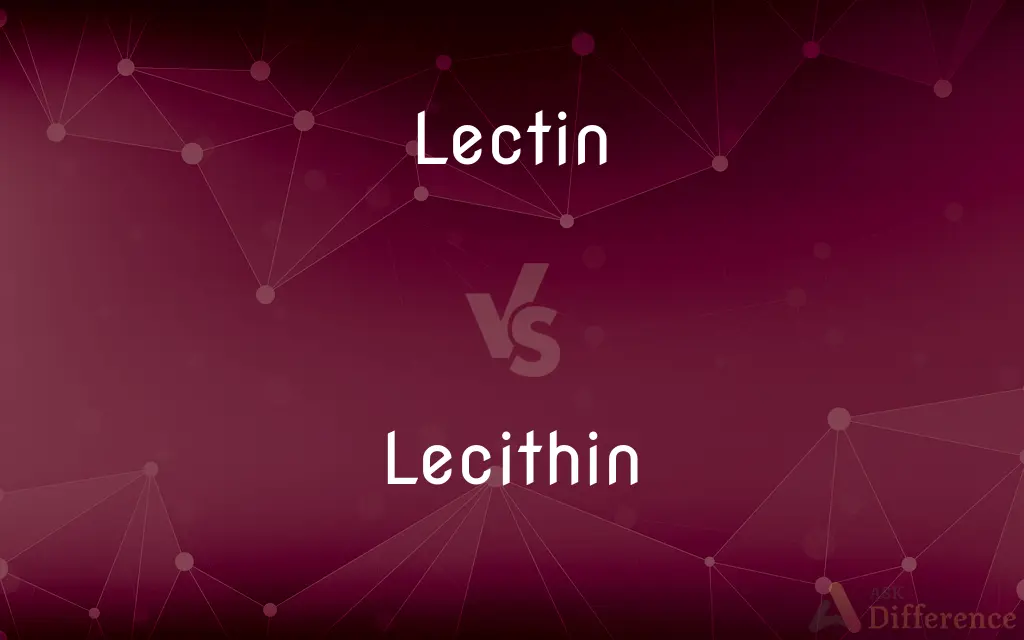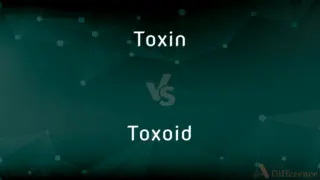Lectin vs. Lecithin — What's the Difference?
By Tayyaba Rehman — Updated on November 6, 2023
Lectin is a protein that binds to carbohydrates and can agglutinate cells, while lecithin is a fatty substance found in plant and animal tissues, used as an emulsifier.

Difference Between Lectin and Lecithin
Table of Contents
ADVERTISEMENT
Key Differences
Lectin is a type of protein that binds specifically to certain sugars and can cause clumping of cells. Found in a variety of plants, especially in seeds and tubers like legumes, lectins play a role in plant defense against predators and have a variety of biological effects on animals and humans.
Lecithin, on the other hand, is a fatty substance that is essential in the cells of the body and can be found in many foods, including soybeans and egg yolks. It's commonly used in the food industry as an emulsifier to prevent the separation of oils and water. Lecithin also has applications in the pharmaceutical and cosmetic industries.
While lectin can interact with blood and digestive systems due to its carbohydrate-binding properties, lecithin is often taken as a dietary supplement for its purported health benefits, which include improving cholesterol levels and serving as a source of choline, an essential nutrient.
Lectins are often the subject of dietary health discussions, with some suggesting that they should be reduced in the diet due to potential negative impacts on gut health.
Lecithin is generally considered a beneficial dietary addition, though it's also a subject of study with respect to its impact on health, including its role in liver function, neuroprotection, and lipid levels in the blood.
ADVERTISEMENT
Comparison Chart
Type
Protein
Fatty substance
Source
Plants, especially legumes
Soybeans, egg yolks, and other foods
Function
Cell agglutination
Emulsifier
Use in Industry
Limited
Food, pharmaceutical, cosmetic
Health Impact
Potential gut irritant
Improves cholesterol, provides choline
Compare with Definitions
Lectin
A carbohydrate-binding protein.
Beans contain lectin, which can be reduced by proper cooking.
Lecithin
A fatty substance in animal and plant tissues.
Soybeans are a good source of lecithin.
Lectin
An immune response facilitator in plants.
Lectin serves as a defense mechanism for plants against pests.
Lecithin
A supplement for cognitive and cardiovascular health.
She takes lecithin capsules for her heart health.
Lectin
A potential anti-nutrient in certain diets.
Some diet plans recommend avoiding lectin for better health.
Lecithin
An emulsifier in food production.
Lecithin is added to chocolate to keep it smooth.
Lectin
A specific glycoprotein that can bind to cell membranes.
Lectin binding to the cell membrane can alter cell behavior.
Lecithin
A component of cell membranes.
Lecithin contributes to the structural integrity of cells.
Lectin
A plant protein that can agglutinate red blood cells.
The lectin in the blood sample caused the cells to clump.
Lecithin
Lecithin (, from the Greek lekithos "yolk") is a generic term to designate any group of yellow-brownish fatty substances occurring in animal and plant tissues which are amphiphilic – they attract both water and fatty substances (and so are both hydrophilic and lipophilic), and are used for smoothing food textures, emulsifying, homogenizing liquid mixtures, and repelling sticking materials.Lecithins are mixtures of glycerophospholipids including phosphatidylcholine, phosphatidylethanolamine, phosphatidylinositol, phosphatidylserine, and phosphatidic acid.Lecithin was first isolated in 1845 by the French chemist and pharmacist Théodore Gobley. In 1850, he named the phosphatidylcholine lécithine.
Lectin
Lectins are carbohydrate-binding proteins that are highly specific for sugar groups that are part of other molecules, so cause agglutination of particular cells or precipitation of glycoconjugates and polysaccharides. Lectins have a role in recognition at the cellular and molecular level and play numerous roles in biological recognition phenomena involving cells, carbohydrates, and proteins.
Lecithin
Any of various substances containing phosphatidylcholine and a variety of other phospholipids, extracted from soybeans, egg yolks, or other sources and used as emulsifiers in a wide range of commercial products, including foods, cosmetics, paints, and plastics.
Lectin
Any of various proteins or glycoproteins that bind selectively to specific sugar moieties of glycoproteins and glycolipids on the surfaces of cells and are found in most organisms, especially plants. They are used to stimulate lymphocyte proliferation and to agglutinate red blood cells.
Lecithin
See phosphatidylcholine.
Lectin
(protein) Any of a class of proteins that bind specific carbohydrates.
Lecithin
(organic chemistry) The principal phospholipid in animals; it is particularly abundant in egg yolks, and is extracted commercially from soy. It is a major constituent of cell membranes, and is commonly used as a food additive (as an emulsifier).
Lectin
Any of several plant glycoproteins that act like specific antibodies but are not antibodies in that they are not evoked by an antigenic stimulus
Lecithin
A complex, nitrogenous phosphorized substance widely distributed through the animal body, and especially conspicuous in the brain and nerve tissue, in yolk of eggs, and in the white blood corpuscles.
Lecithin
A yellow phospholipid essential for the metabolism of fats; found in egg yolk and in many plant and animal cells; used commercially as an emulsifier
Lecithin
A commercial additive in moisturizers and paints.
Lecithin improves the texture of skincare products.
Common Curiosities
Is it necessary to avoid lectins in the diet?
Some people may benefit from a lectin-reduced diet, but this depends on individual health conditions and reactions.
What is lecithin?
Lecithin is a fatty substance present in cell membranes and used as an emulsifier in food products.
What are the benefits of lecithin?
Lecithin is said to improve cholesterol levels, provide choline for the brain, and support liver function.
Are lectins harmful?
Lectins can be harmful if consumed in large amounts or without proper cooking, as they can irritate the digestive system.
What's the best way to reduce lectin intake?
Avoiding foods high in lectins, such as raw legumes and certain grains, can reduce intake.
What are lectins?
Lectins are a type of protein found in many plants that bind carbohydrates and can agglutinate cells.
Can lecithin cause allergies?
It's rare, but some individuals may be allergic to lecithin, especially if derived from soy.
How can I add lecithin to my diet?
Lecithin can be found in foods like eggs and soy or taken as a supplement.
Do all plants contain lectins?
Many plants contain lectins, but they are particularly high in legumes and grains.
Is lecithin a preservative?
Lecithin is not a preservative; it's used as an emulsifier and stabilizer in foods.
Is lecithin vegan?
Lecithin can be vegan if derived from plants like soybeans, but some sources are animal-based.
Do lectins have any health benefits?
Lectins have bioactive properties that can have health benefits, but they should be consumed in moderation.
Can cooking destroy lectins?
Proper cooking can significantly reduce the amount of lectins in foods.
Are lectins found in dairy products?
Lectins are primarily found in plant products and are not a concern in dairy.
Does lecithin help with weight loss?
There's no conclusive evidence that lecithin aids weight loss, though it may support metabolism.
Share Your Discovery

Previous Comparison
Toxin vs. Toxoid
Next Comparison
Cognition vs. MetacognitionAuthor Spotlight
Written by
Tayyaba RehmanTayyaba Rehman is a distinguished writer, currently serving as a primary contributor to askdifference.com. As a researcher in semantics and etymology, Tayyaba's passion for the complexity of languages and their distinctions has found a perfect home on the platform. Tayyaba delves into the intricacies of language, distinguishing between commonly confused words and phrases, thereby providing clarity for readers worldwide.













































